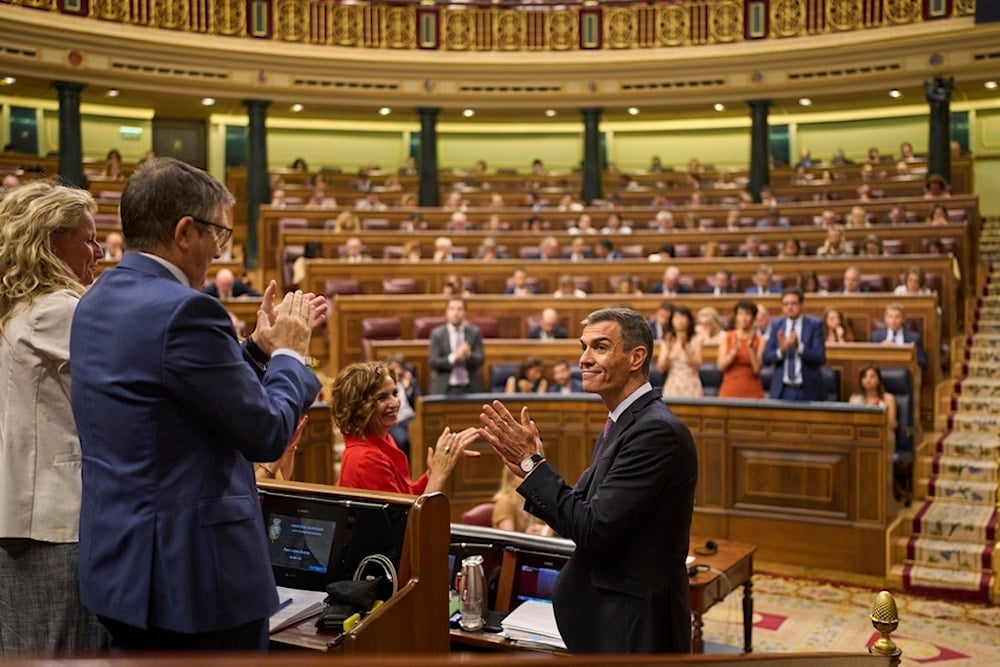Spain passes decree formalizing full arms embargo on 'Israel'
Spain has become the first European country to impose a total arms embargo on "Israel," halting all military trade and transport in response to the ongoing genocide in Gaza.
-

Spanish Prime Minister Pedro Sanchez, right, applauds after delivering a speech at the Spanish parliament in Madrid, Wednesday, July 9, 2025. (AP)
Spain's parliament has narrowly approved a sweeping decree imposing a total embargo on arms and dual-use technology to and from "Israel", marking one of the most decisive actions by a European government in response to "Israel's" ongoing genocide against Palestinians in Gaza.
The decree, passed on Wednesday, forms part of a broader sanctions package introduced last month by Prime Minister Pedro Sanchez's government. It halts all defense exports and imports and bars ships and aircraft carrying fuel or materials for potential military use from accessing Spanish ports and airspace, an effort to prevent any indirect participation in "Israel's" genocidal campaign.
Economy Minister Carlos Cuerpo hailed the measure as "a firm step and pioneering at an international level," while Defense Minister Margarita Robles described it as "the final step in a long process" that began immediately after the October 7 operation, stressing that Spain "stopped selling military material to Israel that very day."
Intense debate
The decree was passed after intense debate, with backing from the far-left Podemos party and several left-wing and regional allies. Podemos leader Ione Belarra, who delayed her party's position until the last moment, ultimately supported the embargo but denounced it as incomplete, calling it a "fake embargo". She accused the government of duplicity, asserting that "four ships carrying US military equipment bound for Israel" had been allowed to dock in Spanish ports despite the embargo's enforcement.
The conservative Popular Party (PP) and far-right Vox opposed the decree, claiming it would harm Spain's diplomatic relationships and "politicize foreign policy." The vote, initially scheduled for Tuesday, was postponed to avoid coinciding with the anniversary of the October 7 operation, a move condemned by "Israel's" Embassy in Madrid, which labeled the timing "perverse and inhuman."
Spain's broader stance against genocide
The embargo represents the centerpiece of a wider sanctions regime targeting "Israel's" atrocities in Gaza and the occupied territories. In addition to halting arms trade, the package bans imports of goods produced in illegal Israeli settlements and expands humanitarian aid to Palestine, part of Madrid's growing effort to hold "Israel" accountable for grave violations of international law.
Spain has become one of Europe's most outspoken governments against "Israel's" actions. In May 2024, Madrid formally recognized the State of Palestine, coordinating the move with Ireland, Norway, and Slovenia in a landmark diplomatic rebuke of "Israel's" occupation policies.
Earlier, in February 2024, Spain and Ireland jointly urged the European Commission to review "Israel's" compliance with the human-rights clause of the EU-"Israel" Association Agreement (Article 2), a mechanism that could trigger trade and political consequences for repeated violations.
In June 2024, Spain filed a declaration of intervention at the International Court of Justice (ICJ) supporting South Africa's genocide case against "Israel", underscoring its stance that "Israel's" military campaign in Gaza constitutes a systematic attempt to destroy the Palestinian people.
Spain has also increased funding for UNRWA and humanitarian programs, pledging more than €150 million through 2026 to sustain relief operations in Gaza at a time when other Western governments have suspended aid.
From recognition to resistance
Madrid's decision reflects mounting international alarm at the persistence of "Israel's" genocidal assault. Despite repeated ICJ orders, UN warnings, and calls for a ceasefire, Gaza remains under systematic bombardment. Entire neighborhoods have been erased, hospitals and aid convoys have been targeted, and more than 67,000 Palestinians have been killed, including tens of thousands of women and children. UN agencies report that over 55,000 children face acute malnutrition amid what they describe as "famine conditions deliberately imposed through blockade."
UN-mandated inquiries as recently as September 2025 confirmed that genocidal acts remain ongoing, and the ICJ continues to hear evidence in the South Africa v. "Israel" case. Humanitarian monitors warn that the ceasefire agreement cannot end the genocide without complete withdrawal, accountability, and structural guarantees of non-recurrence.
In this context, Spain's embargo is not merely symbolic but a concrete political and moral response to an unfolding atrocity.
European divide over 'Israel's' crimes
Spain's stance widens a deepening divide within the European Union, where most governments still align with Washington's pro-"Israel" position or limit themselves to rhetorical concern. By contrast, Ireland, Norway, and Slovenia have coordinated closely with Spain in pushing for diplomatic and legal pressure on "Israel", forming a small but increasingly influential bloc demanding accountability for genocide and war crimes.
In Brussels, Spanish diplomats have pressed for an EU-wide arms embargo and sanctions framework similar to those imposed on Russia following its operation in Ukraine, arguing that Europe's credibility on human rights is collapsing under the weight of its double standards.
Read more: Spanish PM reveals 9 measures to halt genocide in Gaza
Spain's decision marks a historic rupture with Europe's long-standing complicity in "Israel's" crimes. The embargo comes as the genocide enters its third year, with famine, disease, and displacement ravaging what remains of Gaza's population.

 5 Min Read
5 Min Read








